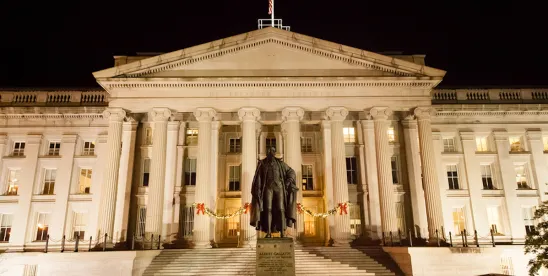On October 28, 2024, the U.S. Department of the Treasury (Treasury) issued final regulations (“Final Rule”) implementing Executive Order 14105, which addresses investments by U.S. persons in certain identified technologies in “Countries of Concern”, including The People’s Republic of China, The Special Administrative Region of Hong Kong, and The Special Administrative Region of Macau. The regulations will go into effect on January 2, 2025.
The Final Rule identifies the following technologies and products subject to the regulations.
- Certain transactions implicating semiconductor and microelectronics are prohibited, including those related to certain electronic design automation software, certain fabrication or advanced packaging tools, the design or fabrication of certain advanced integrated circuits, advanced packaging techniques for integrated circuits, and supercomputers. In contrast, notifiable transactions are those related to the design, fabrication, or packaging of integrated circuits not otherwise covered by the prohibited transaction definition.
- Certain transactions implicating quantum information technologies are prohibited, including those related to the development of quantum computers or production of any critical components required to produce a quantum computer; the development or production of certain quantum sensing platforms; and the development or production of certain quantum networks or quantum communication systems.
- Certain transactions implicating Artificial intelligence (AI) systems are prohibited, including those related to the development of any AI system designed to be exclusively used for, or intended to be used for, certain end uses that are prohibited, as well as those related to the development of any AI system that is trained using a quantity of computing power greater than 10ˆ25 computational operations, or trained using primarily biological sequence data and a quantity of computing power greater than 10ˆ24 computational operations. In contrast, notifiable transactions would be those related to the development of any AI system not otherwise covered by the prohibited transaction definition, where such AI system is: designed or intended to be used for certain end uses or applications; or trained using a quantity of computing power greater than 10ˆ23 computational operations.
The Rule sets forth the penalty and disclosure framework for violations, including civil and criminal penalties, divestment and voluntary self-disclosure. Other key elements of the Final Rule include:
- Outright prohibitions of certain transactions by U.S. Persons implicating highly strategic technologies, and a notification requirement for certain other transactions;
- A knowledge standard, meaning the obligations on U.S. persons will only apply if such person has knowledge of relevant facts or circumstances relating to a transaction. The Final Rule establishes that a U.S. person has knowledge if it possesses actual knowledge that a fact or circumstance exists or is substantially certain to occur, if the U.S. person possesses an awareness of a high probability of a fact or circumstance’s existence or future occurrence, or if the U.S. person could have possessed such information through a reasonable and diligent inquiry;
- The categories of covered transactions to which the prohibition and notification requirements will apply, including the acquisition of an equity interest or a contingent equity interest, certain debt financing that grants certain rights to the lender, the conversion of a contingent equity interest, a greenfield investment or other corporate expansions, the entry into a joint venture and certain investments as a limited partner or equivalent (LP) in a non-U.S. person pooled investment fund;
- Coverage of foreign persons, such as: (i) a person of a country of concern that is engaged in a covered activity related to defined sub-sets of technologies and products, or (ii) a person that has a voting or equity interest, board seat, or certain powers with respect to such a person of a country of concern where more than 50% of one of several key financial metrics of the person is attributable to one or more such persons of a country of concern;
- Excepted transactions, such as investment in publicly traded securities, certain LP investments with a threshold of $2,000,000, derivatives, buyouts of country of concern ownership, intracompany transactions, certain pre-final rule binding commitments, certain syndicated debt financings, equity-based compensation, and third-country measures;
- A national interest exemption: the final rule allows a U.S. person to seek an exemption from the application of the prohibition or notification requirement on the basis that a transaction is in the national interest of the United States; and
- Notification requirements, where a U.S. person subject to the notification requirement is required to file notification with Treasury that includes information related to the transaction, such as details about the U.S. person, the covered foreign person, the covered transaction, and the relevant national security technologies and products.
The Final Rule can be accessed through this website: https://home.treasury.gov/policy-issues/international/outbound-investment-program and additional information can be found on the following link: https://home.treasury.gov/system/files/206/TreasuryOutboundFinalRuleAdditiona
lInformation_0.pdf.
*Special thanks to Felipe Ioschpe for his contributions to the post.*



 />i
/>i

